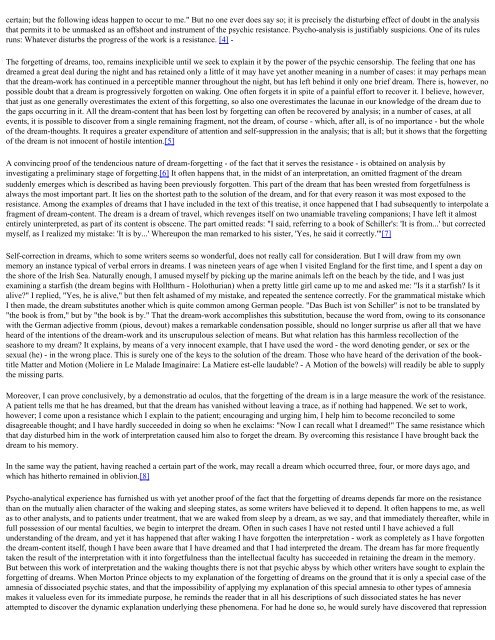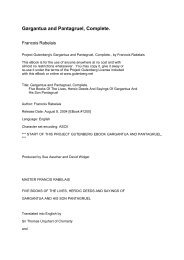The Interpretation of Dreams Sigmund Freud (1900)
The Interpretation of Dreams Sigmund Freud (1900)
The Interpretation of Dreams Sigmund Freud (1900)
Create successful ePaper yourself
Turn your PDF publications into a flip-book with our unique Google optimized e-Paper software.
certain; but the following ideas happen to occur to me." But no one ever does say so; it is precisely the disturbing effect <strong>of</strong> doubt in the analysis<br />
that permits it to be unmasked as an <strong>of</strong>fshoot and instrument <strong>of</strong> the psychic resistance. Psycho-analysis is justifiably suspicions. One <strong>of</strong> its rules<br />
runs: Whatever disturbs the progress <strong>of</strong> the work is a resistance. [4] -<br />
<strong>The</strong> forgetting <strong>of</strong> dreams, too, remains inexplicible until we seek to explain it by the power <strong>of</strong> the psychic censorship. <strong>The</strong> feeling that one has<br />
dreamed a great deal during the night and has retained only a little <strong>of</strong> it may have yet another meaning in a number <strong>of</strong> cases: it may perhaps mean<br />
that the dream-work has continued in a perceptible manner throughout the night, but has left behind it only one brief dream. <strong>The</strong>re is, however, no<br />
possible doubt that a dream is progressively forgotten on waking. One <strong>of</strong>ten forgets it in spite <strong>of</strong> a painful effort to recover it. I believe, however,<br />
that just as one generally overestimates the extent <strong>of</strong> this forgetting, so also one overestimates the lacunae in our knowledge <strong>of</strong> the dream due to<br />
the gaps occurring in it. All the dream-content that has been lost by forgetting can <strong>of</strong>ten be recovered by analysis; in a number <strong>of</strong> cases, at all<br />
events, it is possible to discover from a single remaining fragment, not the dream, <strong>of</strong> course - which, after all, is <strong>of</strong> no importance - but the whole<br />
<strong>of</strong> the dream-thoughts. It requires a greater expenditure <strong>of</strong> attention and self-suppression in the analysis; that is all; but it shows that the forgetting<br />
<strong>of</strong> the dream is not innocent <strong>of</strong> hostile intention.[5]<br />
A convincing pro<strong>of</strong> <strong>of</strong> the tendencious nature <strong>of</strong> dream-forgetting - <strong>of</strong> the fact that it serves the resistance - is obtained on analysis by<br />
investigating a preliminary stage <strong>of</strong> forgetting.[6] It <strong>of</strong>ten happens that, in the midst <strong>of</strong> an interpretation, an omitted fragment <strong>of</strong> the dream<br />
suddenly emerges which is described as having been previously forgotten. This part <strong>of</strong> the dream that has been wrested from forgetfulness is<br />
always the most important part. It lies on the shortest path to the solution <strong>of</strong> the dream, and for that every reason it was most exposed to the<br />
resistance. Among the examples <strong>of</strong> dreams that I have included in the text <strong>of</strong> this treatise, it once happened that I had subsequently to interpolate a<br />
fragment <strong>of</strong> dream-content. <strong>The</strong> dream is a dream <strong>of</strong> travel, which revenges itself on two unamiable traveling companions; I have left it almost<br />
entirely uninterpreted, as part <strong>of</strong> its content is obscene. <strong>The</strong> part omitted reads: "I said, referring to a book <strong>of</strong> Schiller's: 'It is from...' but corrected<br />
myself, as I realized my mistake: 'It is by...' Whereupon the man remarked to his sister, 'Yes, he said it correctly.'"[7]<br />
Self-correction in dreams, which to some writers seems so wonderful, does not really call for consideration. But I will draw from my own<br />
memory an instance typical <strong>of</strong> verbal errors in dreams. I was nineteen years <strong>of</strong> age when I visited England for the first time, and I spent a day on<br />
the shore <strong>of</strong> the Irish Sea. Naturally enough, I amused myself by picking up the marine animals left on the beach by the tide, and I was just<br />
examining a starfish (the dream begins with Hollthurn - Holothurian) when a pretty little girl came up to me and asked me: "Is it a starfish? Is it<br />
alive?" I replied, "Yes, he is alive," but then felt ashamed <strong>of</strong> my mistake, and repeated the sentence correctly. For the grammatical mistake which<br />
I then made, the dream substitutes another which is quite common among German people. "Das Buch ist von Schiller" is not to be translated by<br />
"the book is from," but by "the book is by." That the dream-work accomplishes this substitution, because the word from, owing to its consonance<br />
with the German adjective fromm (pious, devout) makes a remarkable condensation possible, should no longer surprise us after all that we have<br />
heard <strong>of</strong> the intentions <strong>of</strong> the dream-work and its unscrupulous selection <strong>of</strong> means. But what relation has this harmless recollection <strong>of</strong> the<br />
seashore to my dream? It explains, by means <strong>of</strong> a very innocent example, that I have used the word - the word denoting gender, or sex or the<br />
sexual (he) - in the wrong place. This is surely one <strong>of</strong> the keys to the solution <strong>of</strong> the dream. Those who have heard <strong>of</strong> the derivation <strong>of</strong> the booktitle<br />
Matter and Motion (Moliere in Le Malade Imaginaire: La Matiere est-elle laudable? - A Motion <strong>of</strong> the bowels) will readily be able to supply<br />
the missing parts.<br />
Moreover, I can prove conclusively, by a demonstratio ad oculos, that the forgetting <strong>of</strong> the dream is in a large measure the work <strong>of</strong> the resistance.<br />
A patient tells me that he has dreamed, but that the dream has vanished without leaving a trace, as if nothing had happened. We set to work,<br />
however; I come upon a resistance which I explain to the patient; encouraging and urging him, I help him to become reconciled to some<br />
disagreeable thought; and I have hardly succeeded in doing so when he exclaims: "Now I can recall what I dreamed!" <strong>The</strong> same resistance which<br />
that day disturbed him in the work <strong>of</strong> interpretation caused him also to forget the dream. By overcoming this resistance I have brought back the<br />
dream to his memory.<br />
In the same way the patient, having reached a certain part <strong>of</strong> the work, may recall a dream which occurred three, four, or more days ago, and<br />
which has hitherto remained in oblivion.[8]<br />
Psycho-analytical experience has furnished us with yet another pro<strong>of</strong> <strong>of</strong> the fact that the forgetting <strong>of</strong> dreams depends far more on the resistance<br />
than on the mutually alien character <strong>of</strong> the waking and sleeping states, as some writers have believed it to depend. It <strong>of</strong>ten happens to me, as well<br />
as to other analysts, and to patients under treatment, that we are waked from sleep by a dream, as we say, and that immediately thereafter, while in<br />
full possession <strong>of</strong> our mental faculties, we begin to interpret the dream. Often in such cases I have not rested until I have achieved a full<br />
understanding <strong>of</strong> the dream, and yet it has happened that after waking I have forgotten the interpretation - work as completely as I have forgotten<br />
the dream-content itself, though I have been aware that I have dreamed and that I had interpreted the dream. <strong>The</strong> dream has far more frequently<br />
taken the result <strong>of</strong> the interpretation with it into forgetfulness than the intellectual faculty has succeeded in retaining the dream in the memory.<br />
But between this work <strong>of</strong> interpretation and the waking thoughts there is not that psychic abyss by which other writers have sought to explain the<br />
forgetting <strong>of</strong> dreams. When Morton Prince objects to my explanation <strong>of</strong> the forgetting <strong>of</strong> dreams on the ground that it is only a special case <strong>of</strong> the<br />
amnesia <strong>of</strong> dissociated psychic states, and that the impossibility <strong>of</strong> applying my explanation <strong>of</strong> this special amnesia to other types <strong>of</strong> amnesia<br />
makes it valueless even for its immediate purpose, he reminds the reader that in all his descriptions <strong>of</strong> such dissociated states he has never<br />
attempted to discover the dynamic explanation underlying these phenomena. For had he done so, he would surely have discovered that repression









